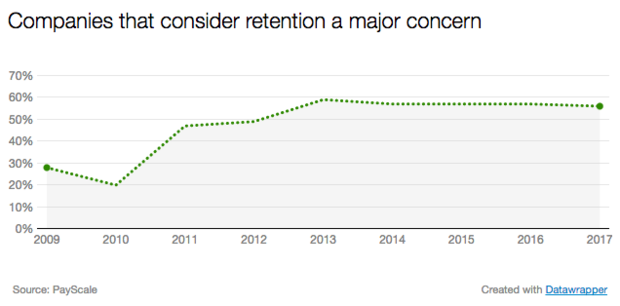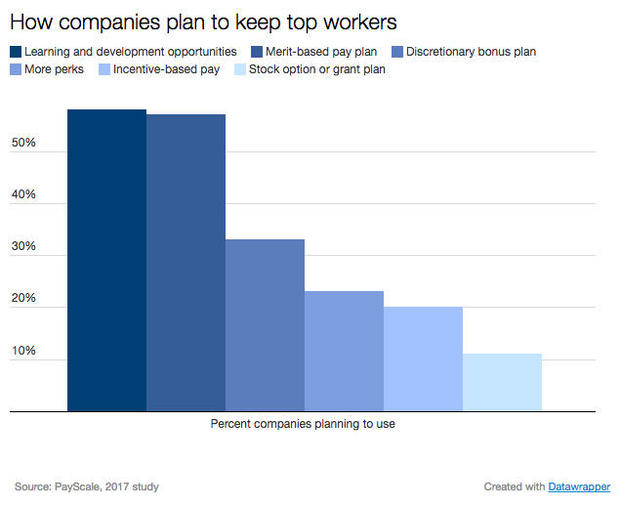Your next job move may not be for more money
As the labor market tightens in the post-recession economy, employers are working harder than ever to keep their employees happy. But some may be focusing on the wrong issues, according to new research from employment site Glassdoor.
While pay packages matter, other professional issues may be more likely to trigger a job search, the Glassdoor research suggests. Workers who feel they’re stagnating in their jobs or who don’t feel their company has a mission or purpose may be more likely to look elsewhere for professional satisfaction, its research found.
Figuring out how to keep employees engaged in their work can be key to lowering turnover, which is costly for employers. Each time a worker leaves for another job, the employer suffers costs of about one-fifth of that worker’s annual salary, due to spending to recruit a replacement and lower productivity as that new hire gets up to speed.
“Pay is top of mind when people are considering outside offers, but what this shows is there’s a lot going on behind the scenes besides pay that affects retention,” said Glassdoor economist Andrew Chamberlain. “The two big factors are culture of the workplace and stagnation in job titles.”
Glassdoor, which examined a database of resumes shared anonymously on its site, analyzed 5,000 examples when employees changed jobs. In almost three-quarters of the cases, the workers left their employers to find new work at another firm. The remaining one-quarter of workers received new titles at their existing employer.
It’s clear that the era of working for one employer throughout one’s career is long over. Employees are changing jobs an average of every 15 months, the research found. Older workers are slightly more likely to remain with an employer longer, but it’s not uncommon for them to depart for greener pastures after a few years.
About 7 out of 10 workers between 40 to 48 leave their employers within five years, compared with about 9 out of 10 workers under the age of 24.
Companies are increasingly worried about keeping workers. In a separate study from Payscale, more than half of companies called retention “a major concern” -- a portion that has stayed steady for several years.
Workers are looking for professional challenges, which may explain why stagnation is a job killer. Every 10 months that an employee stagnates in the same job raises the chance by 1 percent that the employee will leave the company when ready for an upward move, rather than seek a promotion within the firm.
Stagnation could also indicate the employer doesn’t envision career development for their workers, which would make those workplaces less appealing for many employees.
“We found clearly that people who stagnate in one job title are more likely to leave that company when they move onto their next role,” Chamberlain said.
So how does compensation figure into the equation? Pay is clearly important, given that employees who switch jobs earned 5.2 percent more in their now position than in their prior one. Yet workers who moved internally received an even bigger pay boost: The average pay hike was pegged at 14 percent. Most internal moves are likely due to those workers receiving promotions and pay bumps, Chamberlain said.
While receiving a fatter paycheck is a benefit of switching jobs, Glassdoor found that workers are also switching for what they consider to be a better company culture. That holds true for workers who didn’t receive a pay raise, which means the allure of working for a company with strong values may be more important to many workers.
In the Payscale study, the most popular method employers reported for keeping workers wasn’t pay increases, but “learning and development opportunities.” It’s the first time since Payscale started doing that study that the top answer didn’t touch on pay, said Tim Low, the company’s senior vice president.
“Learning and development and the idea of providing for career paths is important,” he said. “It speaks to what employees really care about in their relationship to their employer. If you’re willing to make investments in your people, in training and learning and development, it’s a vote of confidence in your employees. And it works as a way to increase employee engagement.”
Competitive industries may also provide more opportunities for pay advancement. The study found that employers pay more for workers in competitive roles, such as technology and engineering. Interestingly, some of the least-competitive jobs in Payscale’s study ranked as carrying the highest stress levels in a separate CareerCast study about workplace stress. Education, for instance, is ranked as the least competitive industry by Payscale, yet CareerCast found that educators reported high levels of stress.
“Companies with a good culture and values are more likely to retain” employees, while workers may shift jobs because they want to feel good about where they work, Chamberlain noted.
While the research suggests employers should examine their career development and promotion pathways, workers can also take away a useful lesson: Negotiate with your current workplace for a new title or pay bump before looking outside the firm. Because employers have a lot to lose when workers leave, they may be more flexible than workers imagine when it comes to pay and titles, Chamberlain noted.
Of course, it’s not always easy to discuss pay. Fewer than one in five organizations were confident in their managers’ abilities to have “tough” conversations about compensation with their workers, according to a new Payscale study. That may come as no surprise when one learns that only three out of 10 companies provide training for their managers about how to discuss pay with workers.
Julia Haslanger, an engagement consultant in Chicago, experienced this lack of data firsthand as a graduate student. Searching for information on social media journalists’ pay, she found none, and created a tool to crowdsource journalists’ salaries. Within two weeks, she had 2,500 responses, at which point she stopped counting, she said.
“I didn’t expect so many people to reply,” she told CBS MoneyWatch.
“What was surprising to me was how many bosses and managers wanted to know how much they should be paying people,” she recalled. “A lot of the time people are paid something because that’s what other people are paying.”
Employees are increasingly armed with information that can help them in negotiations, given sites such as Payscale and Glassdoor publish information about salaries. While only about one out of three companies say they’re transparent about pay, about half say they’re aiming for transparency this year, Payscale found in its study.
The top three reasons for providing pay hikes are performance, retention and market adjustments, with the latter supporting the push for pay transparency. The issue is particularly problematic for women, who continue to suffer from a gender pay gap, or when they’re paid less for doing the same job than men. In many cases, women aren’t aware they’re earning less because the majority of private companies treat pay data as confidential information.
“Transparency has had an overwhelmingly positive impact on employees, but you have to be careful. It doesn’t solve all problems,” said Glassdoor’s Chamberlain. “If you’re severely underpaid, there’s evidence that makes people feel badly, and they can be more likely to leave.”
He added: “That’s an improvement” for the employee. Whether it helps the business isn’t as clear.





